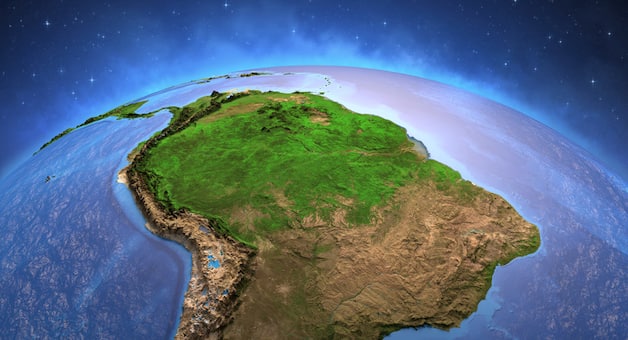Connected across half the globe: If the climate in the Amazon region changes, this will affect Tibet, around 20,000 kilometers away, as a study reveals. Accordingly, these and other tipping elements in the climate system are linked to one another via global long-distance connections. The scientists warn in “Nature Climate Change” that this increases the risk that regional changes in the climate system could also lead to a fatal overturning of the tipping elements at the other end of the world.
The Amazon region, the sea ice and the North Atlantic current are tipping elements in the earth’s climate system. When a certain threshold is reached, they can suddenly tip over into a new state of equilibrium. Parts of the Greenland ice sheet and West Antarctica could already be approaching such a tipping point, the North Atlantic Current has reached a historically unprecedented state of weakness and the Amazon rainforest is also close to its tipping point from rainforest to savannah.
What is even more serious: these tipping elements are not isolated, but are closely connected to one another via feedback. Therefore, if one of these switches flips, it could trigger a whole cascade of tipping points that could, in a domino effect, throw the entire climate system out of balance.
Teng Liu from Beijing Normal University and his colleagues have now found out how far-reaching these couplings of tipping elements are. For their study, they examined whether there are concrete indications of long-distance connections between tipping elements such as the Amazon rainforest and other tipping elements. To do this, they analyzed how the near-surface air temperature has changed over the past 40 years at more than 65,000 different nodes on the globe.
“While the Amazon region itself is of course an important element of the Earth system, there is also the burning question of whether and how changes in this region could affect other parts of the world,” explains Luis’ colleague Jingfang Fan. Rainforests are under severe pressure from deforestation, fires, road construction and warming and this trend is likely to continue in the future.
The analyzes revealed: There are indeed long-distance connections between the Amazon and at least two other tipping points. The first is the West Antarctic Ice Sheet, which was already known to be coupled with the climate of South America. The second long-distance connection, however, goes halfway around the globe. Because the invisible but significant influence connects temperatures and precipitation in the Amazon region with the climate on the Tibetan plateau in the Himalayas.
The coupling between these tipping elements thus spans a distance of a good 20,000 kilometers. “We were surprised to see how strongly the climate extremes in the Amazon region are linked to the climate extremes in Tibet,” says co-author Jürgen Kurths from the Potsdam Institute for Climate Impact Research (PIK). “If it gets warmer in the Amazon, it will get warmer in Tibet too. So there is a positive correlation for temperatures.” In contrast, the feedback for precipitation is negative: if it rains more in the Amazon region, less snow falls in Tibet.
The mechanisms by which these two tipping elements are linked became apparent in more detailed analyzes using climate models. Accordingly, this long-distance connection consists of three parts. The first stretches from the east coast of South America to southern Africa and is characterized by high pressure areas that are blown across the Atlantic to Africa by the prevailing westerly winds.
The second leg of this coupling connects Southern Africa with North Africa and the Middle East. “The intratropical convergence zone controls the African monsoon and thus the winds that blow from south to north Africa,” explains the research team. Finally, the third section connects North Africa and the Middle East with the Himalayan region via the westerly winds that prevail in these latitudes.
“For the first time, we have been able to clearly identify and quantify such a long-distance connection,” says Fan. “Our research confirms that the tipping elements of the Earth system are indeed interconnected over large distances. The Amazon is a key example of how this could play out.”
The analyzes also revealed that the snowpack on the Tibetan plateau is already approaching a tipping point. Since 2008, this cooling blanket on top of the world has been losing its stability. “That has been overlooked so far,” says Kurths. This is also important because the Tibetan plateau, despite its remote location, is an important water reservoir for millions of people in the catchment area of the rivers that have their source there.
“Our research underscores that tipping cascades are a serious risk. Linked tipping elements in the Earth system can influence each other, with potentially serious consequences,” says co-author Hans Joachim Schellnhuber from PIK. “To be clear, the climate system as a whole is unlikely to flip. But subcontinental tipping events can severely impact entire societies over time and threaten important parts of the biosphere.”
In the opinion of the research team, the long-distance connections and the possible cascade of overturning tipping elements must therefore be taken into account more than before in climate protection and adaptation to climate change. (Nature Climate Change, 2023; doi: 10.1038/s41558-022-01558-4)
Source: Potsdam Institute for Climate Impact Research
This article was written by Nadja Podbregar
Djamila, Lucas and Gigi gave everything again on the last day in the camp. Ironically, however, Lucas, who got the most stars in the test, was the first to say goodbye. Djamila, on the other hand, initially got zero stars – and then the crown. The finale to read in the ticker protocol.
Prince Andrew has been forced to step down from his royal duties following an abuse scandal. But he would like to contest the comparison with Virginia Giuffre and he also supposedly has an ace up his sleeve for a better image: a new “development” next month should help.
The original of this article “Why climate change really affects everyone in the world” comes from scinexx.















